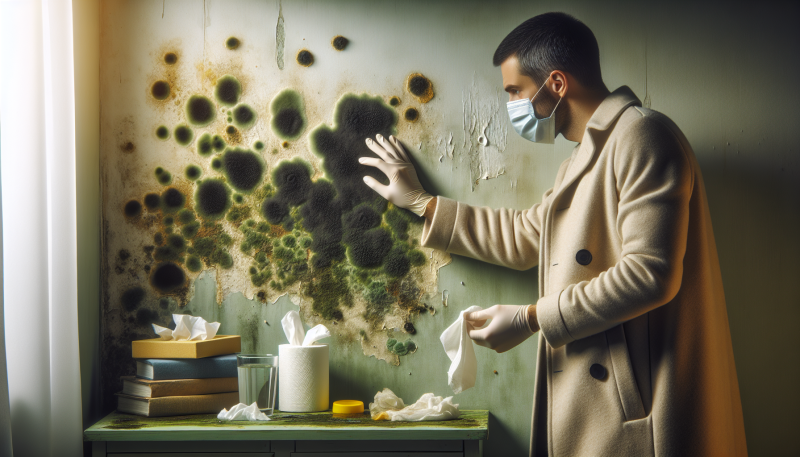Mold is one of those sneaky little nuisances that can invade our homes without us even realizing it. It thrives in damp, warm environments and can lead to a host of health problems if left unchecked. In this article, we’ll dive deep into the health effects of mold exposure, how to identify it, and the importance of professional mold remediation services. So, grab a cup of coffee, and let’s get started!
What is Mold and Why Does It Matter?
Mold is a type of fungus that can grow both indoors and outdoors. It reproduces through tiny spores that float in the air, and when these spores land on a damp surface, they can start to grow. You might be wondering, “Why should I care about mold?” Well, mold can cause various health issues, especially for those with allergies, asthma, or weakened immune systems. It’s not just an aesthetic problem; it’s a health hazard!
When mold spores are inhaled, they can trigger allergic reactions, respiratory issues, and even more severe health problems. This is why understanding mold and its effects is crucial for maintaining a healthy living environment. If you suspect mold in your home, it’s essential to seek professional restoration services to address the issue promptly.
Health Risks Associated with Mold Exposure
Exposure to mold can lead to a variety of health problems. The most common symptoms include:
- Allergic Reactions: Sneezing, runny nose, and itchy eyes are common signs of mold allergies.
- Respiratory Issues: Mold can exacerbate asthma and lead to chronic coughing or wheezing.
- Skin Irritation: Direct contact with mold can cause rashes or skin irritation.
- Serious Health Conditions: In some cases, prolonged exposure can lead to more severe conditions like lung infections.
It’s important to note that not everyone reacts to mold in the same way. Some people may experience severe symptoms, while others might not notice any effects at all. However, if you or someone in your household is experiencing these symptoms, it’s time to take action. Consider contacting an emergency service for mold remediation.
Identifying Mold in Your Home
So, how do you know if you have mold lurking in your home? Here are some signs to look out for:
- Visible Mold: This is the most obvious sign. Look for black, green, or white patches on walls, ceilings, and floors.
- Musty Odors: A damp, musty smell can indicate mold growth, even if you can’t see it.
- Water Damage: If you’ve experienced water damage, such as from a leak or flood, mold is likely to follow.
If you notice any of these signs, don’t wait! Mold can spread quickly, and the longer you wait, the more extensive the damage can become. Reach out to a water damage restoration service to assess the situation and provide the necessary remediation.
The Importance of Professional Mold Remediation
You might be tempted to tackle mold removal on your own, but this can often lead to more problems. Professional mold remediation services are equipped with the right tools and expertise to handle mold safely and effectively. Here’s why you should consider hiring professionals:
- Thorough Inspection: Professionals conduct a comprehensive inspection to identify the extent of the mold problem.
- Safe Removal: They use specialized equipment and techniques to remove mold without spreading spores.
- Prevention: Experts can help identify the source of moisture and provide solutions to prevent future mold growth.
When you choose a professional service, you’re not just getting rid of mold; you’re investing in your health and the integrity of your property. Remember, customer satisfaction is key, and a reputable company will ensure that your home is mold-free and safe.
Conclusion
Mold exposure is a serious issue that can affect your health and well-being. Understanding the risks, identifying the signs, and seeking professional help are crucial steps in managing mold in your home. If you suspect mold growth, don’t hesitate to contact a professional restoration service. Remember, your health is worth it!
FAQs
What are the symptoms of mold exposure?
Common symptoms include sneezing, runny nose, itchy eyes, coughing, and skin irritation. In some cases, prolonged exposure can lead to more severe respiratory issues.
How can I prevent mold growth in my home?
To prevent mold, keep your home dry and well-ventilated. Fix leaks promptly, use dehumidifiers, and ensure proper drainage around your property.
Is it safe to remove mold myself?
While small areas of mold can be cleaned with proper precautions, it’s often safer and more effective to hire professionals for larger infestations.
How long does mold remediation take?
The duration of mold remediation depends on the extent of the infestation. A thorough inspection can provide a better estimate of the time required.
What should I do if I suspect mold in my home?
If you suspect mold, contact a professional restoration service immediately to assess the situation and begin remediation.
For more information or to schedule a consultation, call us now at 855-933-7935. We are committed to quality service and ready to help you with all your restoration needs!

